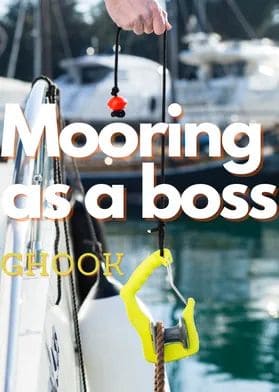Metal & Steel Cleaners
In this section, the topRik marketplace presents care products for stainless steel and other metals used in parts and equipment of the yacht. Here you can find solutions from the world's best manufacturers of yacht care products, including Star brite, Iosso, Arexons, BRAVA Srl. and other famous companies.
Carefully read the accompanying texts for each product, and if you have questions, ask them to topRik experts, who will give you free advice on any product. You can contact them through quick contact form, links to a phone call or sending an email to [email protected].
Why Metal & Steel Cleaners are Needed on a Yacht
Even if a yacht or boat has a fiberglass rather than metal hull, any experienced sailor will tell you that the vessel in any case needs a set for the care of non-ferrous and ferrous metals. After all, on a yacht, these materials are used to make (in addition to the hull) handrails and brackets, clamps and holders, filler necks, cleats, rollers, bollards, hooks, fairleads, winches, anchor winches, etc.
Most of these useful and necessary parts and objects require care, since they are constantly in an aggressive environment: sea salt, water, temperature changes, ultraviolet radiation, mechanical damage, etc. All these natural phenomena and mechanical stress destroy protective coatings: paint, primer, anodizing, even alloying in the case of stainless steel. All of this opens the way for corrosion, to which iron alloys instantly succumb: types of steel, cast iron, ferroalloys, etc.
Just consider what will cost less: not too frequent maintenance of these metal parts and elements using special cleaning and protective agents, or their regular replacement when signs of corrosion appear. Of course, if the yacht owner allows the latter option, he has the right to destroy his property at an accelerated pace, and we will not comment on this case.
By the way, the old joke about cleaning rust from an anchor with a file has long been outdated for modern yachts. Innovative anchors for them have long been made of stainless steel, and the owner of a yacht who cares about its appearance will not allow a rusty monster to spoil the appearance of his boat.
Products for Eliminating Corrosion from the topRik Marketplace
Effective metal & steel cleaners are offered to you by the topRik marketplace - from powerful universal cleaners for any yacht surface that eliminates slipping to rust converters that quickly and effectively transform it into a protective layer.
Universal cream varnishes from Iosso will restore the original appearance of any surface, including metal ones: from steel to copper, brass and bronze. These creamy polishes will remove rust and make metal shine without slipping.
We also offer a large selection of products for the care of stainless steel surfaces, such as Inoxtone from the Italian BRAVA, which not only removes rust, but also creates a protective layer.
You might want to take a look at the line of polishes from the famous English Star brite - one of the leaders in the production of marine care products. For example, chrome and stainless steel polish is resistant to sea salt, water and ultraviolet light. It not only cleanses these metals from traces of corrosion, but by binding to them, it provides long-term protection from harmful environmental influences.
What is Galvanic and Electrolytic Corrosion
So, most metal products require special processing. We have not yet mentioned the features of some electrical equipment and such a dangerous phenomenon as galvanic corrosion.
Sea water has very low electrical resistance and conducts electricity well. In other words, it behaves like an electrolyte. If two different metals, electrically connected, are surrounded by an electrolyte, we get a voltaic cell - better known as a battery.
Once a pair of different metals forms a galvanic cell, one of them, higher in the periodic table of chemical elements, becomes the cathode and the other the anode. It is the anode that begins to corrode, releasing its metal into the electrolyte. This process is called "galvanic corrosion".
You can give many examples that any long-time practicing yachtsman will tell you. Here is the least obvious of these examples: copper-based antifouling paint can also cause corrosion of the saildrive’s aluminum or iron keel. In this case, they not only made a mistake in choosing a compatible paint, but also neglected the special treatment with metal & steel cleaners.
Electrolytic corrosion is the result of forced flow of electric current through an electrolyte to either of two metals. The current in the electrolyte flows from the anode (+) to the cathode (-), and the anode will be destroyed. But in this case the process is faster and depends on the current strength.
Other Equipment Problems Caused by Metal Corrosion
It is not only the open surfaces of the yacht that suffer from the harmful effects of sea water and other negative environmental factors. As we have already mentioned, this also affects the operation of the equipment, which can lead to unexpected breakdowns during sailing if the yacht is in inexperienced hands.
An experienced sailor knows that it is not only corrosion that threatens metal products on a ship...
Problems with the Engine
What kills your engine the most? Cold sea water. Possessing a high salt content, through the process of galvanic corrosion, it removes iron from the cast iron of the cylinder block and cylinder head, leaving soft graphite in its place, which is easy to scrape off with a penknife.
The first victim is the sharp edges. It is for this reason that marine engines are designed with massive blocks that can withstand this process for a long time.
It is worth noting that the cause of the destruction of different parts is not always corrosion. Any curved tubes are destroyed at the bends due to the friction of hot water running through them at high speed.
Copper is one of those metals that quickly forms a layer of oxides on its surface, protecting it from corrosion. Lead, aluminum, and stainless steel protect themselves in a similar way. Salt water flowing through the pipes contains a sufficient amount of oxygen to form an oxide film on the surface of the pipe, but before it has time to form, it is immediately washed away by the same flow.
Like all metals, copper has a fine-grained structure, and when the metal is bent or twisted, its structure is disrupted and corrosion progresses in these areas. These phenomena should be sufficient reason for the owner to close the cooling system inlet valve when leaving the boat.
Propeller Shaft Issues
To form a protective oxide film on the surface of stainless steel, a constant flow of oxygen must be provided. Otherwise, “pitting” corrosion develops. This may occur in areas and connections on the boat where oxygen is excluded. One such place is the stern tube, in which the propeller shaft is in stagnant water, very poor in oxygen.
Stainless steel can also suffer from a process called weld corrosion. You have often seen polished stainless steel parts on yachts covered with rust in the weld area. At the moment of welding, under the influence of high temperature, the alloying metal chromium is removed from the molten weld, leaving iron instead, which will rust.
Fighting Scale and Sludge
Scale is the name given to dense deposits that form on the heating surface. Sludge includes substances that fall out in the form of a mobile sediment, which can also form secondary scale by sticking to the surface of pipes or tanks. Secondary scale can be formed by products of metal corrosion inside a tank with boiled (hot) water.
The formation of sediment in the form of scale or sludge occurs in the presence of a supersaturated solution, i.e., a high concentration of salts.
Scale formation when using seawater is a problem not only for large maritime transport, but also for small-sized fleets. And this problem concerns not only water storage tanks, but also engines, although seawater is not used in the engine cooling system.
topRik marketplace has selected some of the most effective anti-scale and sludge products. For example, the ENGINET cleaner from the famous Italian manufacturer BRAVA Srl. It is ready to use and quickly dissolves grease and sludge, effectively keeping your engine, tanks and bilge clean.
Another example of an effective anti-scale product is FULCRON from the largest Italian company in the field of auto chemicals and auto cosmetics. This cleaner is non-toxic and biodegradable, making it safe for any environment. It also does not contain harsh chemicals, making it suitable for use in water tanks. It quickly and effectively removes dirt, grease, scale and oxidation from virtually any surface, including fiberglass, metal, plastic and rubber.
In our catalog we have the best metal & steel for you cleaners, including:
- yacht hull cleaners;
- yacht deck cleaners;
- metal reducers;
- protective agents against all types of corrosion;
- scale cleaners on metal, including the engine;
- polishes with rust removal effect;
- rust converters into a protective layer;
- care products for ferrous metals;
- care products for non-ferrous metals, etc.
If you don’t find anything listed or what you need on this page, contact our experts - they will help you choose a metal care product that exactly meets your requirements and the characteristics of your vessel. All consultations are free.


